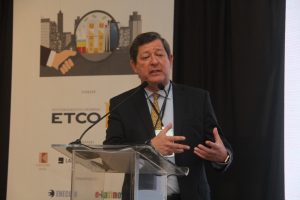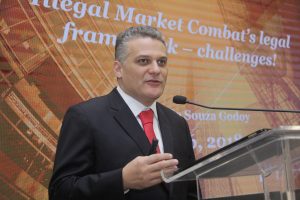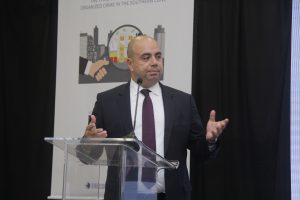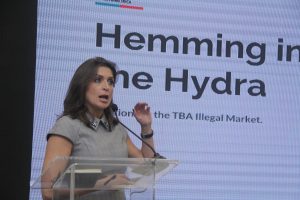Unrestrained illegal activity supports factions such as the PCC and Comando Vermelho. Theme is discussed at the 12th Enecob
The illegal market generates losses of, on average, R $ 130 billion per year for the Brazilian productive sectors. Facing the practice of smuggling, however, comes up against the feeling of impunity and insufficient police action. With 16 kilometers of border with ten countries to care for, the Federal Police has just over 10 agents and 24 police stations to control.
In 2016, there were 13.674 police officers across the country, but the number of employees had no replacement for the exits in recent years. “The border policy in Brazil has to be of homogeneous investments”, defends the delegate Fabiano Bordignon, head of the corporation in Foz do Iguaçu, where it has been, since Monday (16), 12th National Meeting of Editors, Columnists, Reporters and Bloggers (Enecob), that debates the topic.
“Criminal factions cross borders and challenge the state. Brazil does not end at the border with Paraguay, it overflows there and vice versa. The idea of watertight borders no longer exists. There is a great potential for corruption with smuggling because they are small penalties and risk with big profits. Fighting only with police is no use. You have to review the taxation ”, he defends, remembering that the Tax burdens from neighboring countries, such as Paraguay, foster illegality.
The smuggling routes
Goods, medicines, cigarettes, weapons, drugs and ammunition cross the Brazilian borders illegally for smuggling and embezzlement. According to information from the Federal Revenue Service and from the Federal Police, factions such as the First Capital Command (PCC) and the Red Command (CV) increasingly expand their operations in neighboring countries to have access to illegal products.

“Borders are being occupied by organized crime. The CCP controls cigarette trafficking, which gives them great liquidity, even though they also smuggle weapons and drugs, ”says Edson Vismona, president of the Etco Institute, a business entity that works to combat tax evasion and illegal trade. It is estimated that 48% of sales in Brazil are from contraband cigarettes and almost all from Paraguay.
Since 2014, smuggling and embezzlement crimes have been distinguished by Brazilian law. The first consists of importing and exporting prohibited products and is punishable by two to five years in prison. The other deals with the non-payment of taxes for the entry or exit of products, as in the case of buying electronics on international trips, with a maximum penalty of four years. Generally, both are practiced at the same time.

Luciano Godoy, lawyer and professor at Getúlio Vargas Foundation (FGV), points out that smugglers do not feel cornered by the possibility of punishment. “As the penalties are very low, most people do not even serve in a closed regime. Most are not even caught. When it is, in the end the person is released. The perception of impunity is much more serious than impunity itself. It is necessary to train public agents, material and human resources for careers. It is necessary to create a new legal framework to fight smuggling in public security ”, he says.
Lawless land (that works)
He continues the analysis and puts the capacity of Justice in check. “There is no structure for judging on a large scale. The Brazilian Judiciary judges individual cases, but when I see the phenomenon of cigarette smuggling, I don't see one case at a time, but a macro crime that requires training, information and interaction between countries, the public and private sectors, in order to be able to fight, ”he compares. .
The expert also points out problems in the application of the law, which, in his view, places responsibility on the weakest link in the criminal organization's chain: the so-called “mules”, who transport the product but profit little or benefit from the scheme .

Secretary General of Association of Federal Judges (Ajufe), Fernando Mendes believes that there are not yet “enough tools to fight macro crime”. For him, in addition to improving the Legal Framework, the jurisdictional provision needs to be effective. “We need justice that provides answers in a reasonable time from a constitutional point of view. Only changing the typification without thinking about the performance of the organs will end up producing ineffective results. Today, the model

contributes to the inefficiency of the result ”, he considers.
For Vanessa Neumann, founder of Asymmetrica, a political risk research and consultancy company, it is necessary to have a cooperative action to be effective. “Seems to have apprehensions here and there. When a cell is removed, it is easily restored ”, he points out. Thus, she thinks that it is necessary to act more broadly for an efficient siege.
Source: Jornal de Brasíllia - 18/04
ETCO Photos




